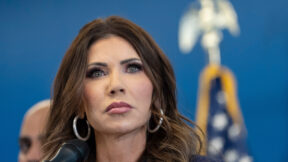Trump Fans On CNN Agree Slavery Was ‘Reprehensible’ And ‘Bad’ — But Defend Trump’s Slavery Rant
Trump defenders Scott Jennings and Batya Ungar-Sargon agreed with CNN anchor Abby Phillip that slavery was bad and even “reprehensible” — but still defended President Donald Trump’s rant on “woke” history about “how bad slavery was.”
Trump ranted Tuesday that “The Museums throughout Washington, but all over the Country are, essentially, the last remaining segment of ‘WOKE.’ The Smithsonian is OUT OF CONTROL, where everything discussed is how horrible our Country is, how bad Slavery was, and how unaccomplished the downtrodden have been.”
He went on to write:
Nothing about Success, nothing about Brightness, nothing about the Future. We are not going to allow this to happen, and I have instructed my attorneys to go through the Museums, and start the exact same process that has been done with Colleges and Universities where tremendous progress has been made. This Country cannot be WOKE, because WOKE IS BROKE. We have the “HOTTEST” Country in the World, and we want people to talk about it, including in our Museums.
On Tuesday’s edition of CNN NewsNight, Phillip began her show with a searing rejoinder to Trump that included the devastating testimony of a formerly enslaved person.
Phillip jumped right into the subject with a panel comprised of Scott Jennings, Bakari Sellers, Batya Ungar-Sargon, Sabrina Singh, and Leah Wright Rigueur.
Jennings and Ungar-Sargon each praised and agreed with Phillip’s commentary but offered varied defenses of Trump. Jennings reinterpreted Trump’s rant for the table:
PHILLIP: Why is he equating talking about slavery with woke?
JENNINGS: Well, look, I think let me just start this conversation by saying that my personal view is slavery was a reprehensible institution. I agree with your words, that it was our original sin. We also fought a war to eradicate it and to get over it as a country. And that was a necessary thing that happened and a lot of people died. And we did eradicate it. And that’s a good thing.
I think what he’s asking is in our museums, what defines us?
Are we going to be defined by the worst moment or the worst institution, or the worst mistake we ever made, or are we going to be defined by what we’ve done moving forward to get over it and to become the greatest nation on the Earth?
My belief is that he wants to look at these museums, not because he wants to do away with the idea that slavery occurred but that he wants to ask a very simple question, are we going to present ourselves as being exceptional or not? And I think he believes there is an effort by some to continue to try to define us from our worst moment, instead to try to focus and define us based on our best moments, which started when we eradicated slavery and began to move forward as the light of the world. And so that’s what I think.
Ungar-Sargon “humbly” joined the conversation by telling Phillip, “I loved your opening” — then defended Trump based on an increase in the mentions of “White Supremacy”:
PHILLIP: I also come back to why the focus so much on slavery when it comes to rewriting history? There’s a lot of history that it’s in these museums, but he’s focused on one thing, and that is that there’s too much slavery being mentioned in the United States of America. That’s very odd, Batya, honestly.
UNGAR-SARGON: So, I want to start by saying I actually agree with everything that’s been said, and I loved your opening. And so I offer these comments very humbly, because it’s an honor to be included in this conversation, which is very solemn, and I think we all understand that and we are all looking for the common ground here.
And so what I’m about to say, I don’t mean in any way to negate that tone, but starting around 2011, 2012, sociologists started to notice a shift in white liberal opinion polling to where white progressives became more extreme in their views on race than black and Hispanic Americans.
And they called this, the sociologists did, called it the great awokening. And when they postulated, where did this come from? Why did white progressives suddenly start obsessing over race in a way that was actually far to the left of where Hispanic and Black Americans were on this issue, they found that the media had shifted radically how it talked about these issues.
So, for example, in 2010, the words white supremacy were mentioned 75 times in The Washington Post and The New York Times.
PHILLIP: But the media’s different from museums.
UNGAR-SARGON: In 2020, the words white supremacy were mentioned 700 times in The Washington Post and The New York Times, and 2,400 times in NPR, the word racism 4,000 times in 2020, the words white and racial privilege from 2013 to 2019 grew by 1,500 percent in The New York Times and The Washington Post. And the word slavery itself exponentially skyrocketed as a percentage of words.
I’m offering this only to suggest —
PHILLIP: Yes, I understand. I’m just wondering what do you think is the problem so with talking about slavery, white supremacy, racism, et cetera, what’s the problem?
UNGAR-SARGON: So, the point I’m trying to make here is that liberals will say, well, this is a reflection of reality. But, of course, it isn’t. This is a reflection of a newfound obsession that was driven by the media. And that doesn’t reflect well, I guess not either the moral evil or the historical accuracy.
PHILLIP: I do want to dive into what you mean by that, because you say that it’s — you don’t think it’s a reflection of reality. Based on what? Based on the idea that those things don’t exist based on that white, based on white supremacy doesn’t exist, racism doesn’t exist, that we shouldn’t be talking about it anymore?
Phillip went on to point out that the increase in “White Supremacy” mentions occurred in a time period that saw racist mass murders and other deadly White supremacist violence.
Watch above via CNN NewsNight.





Comments
↓ Scroll down for comments ↓